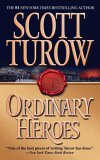Summary | Excerpt | Reading Guide | Reviews | Beyond the Book | Readalikes | Genres & Themes | Author Bio

It did not work out. For one thing, I lacked a subject. Who the hell really
cared about the decades-old murder trial of the Chief Deputy Prosecuting
Attorney that I'd once thought was such a nifty topic? Instead, three times a
day, I found myself staring across the table at Nona, my high-school sweetheart,
where it swiftly became apparent that neither of us especially liked what we
were seeing. I wish I could cite some melodrama like an affair or death threats
to explain what had gone wrong. But the truth is that the handwriting had been
on the wall so long, we'd just regarded it as part of the decorating. After
thirty years, we had drifted into one of those marriages that never recovered
its motive once our daughters were grown. Nine weeks before Dad's passing, Nona
and I had separated. We had dinner once each week, where we discussed our
business amiably, frustrated one another in the ways we always had, and
exhibited no signs of longing or second thoughts. Our daughters were devastated,
but I figured we both deserved some credit for having the guts to hope for
better at this late date.
Nevertheless, I was already feeling battered before Dad died. By the time we
buried him, I was half inclined to jump into the hole beside him. Sooner or
later, I knew I'd pick myself up and go on. I'd been offered freelance gigs at
two magazines, one local, one national. At five foot nine and 215 pounds, I am
not exactly a catch, but the expectations of middle age are much kinder to men
than women, and there were already signs that I'd find companionship, if and
when I was ready.
For the moment, though, out of work and out of love, I was far more interested
in taking stock. My life was like everybody else's. Some things had gone well,
some hadn't. But right now I was focused on the failures, and they seemed to
have started with my father.
And so that Monday, while my mother thought I was struggling into Dad's
trousers, I remained in his closet and read through dozens of his wartime
letters, most of them typed Army V-mails, which had been microfilmed overseas
and printed out by the post office at home. I stopped only when Mom called from
the kitchen, suggesting I take a break. I found her at the oval drop-leaf table,
which still bore the marks of the thousands of family meals eaten there during
the 1950s.
"Did you know Dad was engaged before he met you?" I asked from the doorway.
She revolved slowly. She had been drinking tea, sipping it through a sugar cube
she clenched between her gapped front teeth, a custom still retained from the
shtetl. The brown morsel that remained was set on the corner of her saucer.
"Who told you that?"
I described Grace's letter. Proprietary of everything, Mom demanded to see it at
once. At the age of eighty, my mother remained a pretty woman, paled by age, but
still with even features and skin that was notably unwithered. She was a
shrimp—I always held her to blame that I had not ended up as tall as my
father—but people seldom saw her that way because of the aggressive force of her
intelligence, like someone greeting you in sword and armor. Now, Mom studied
Grace Morton's letter with an intensity that seemed as if it could, at any
instant, set the page aflame. Her expression, when she put it down, might have
shown the faintest influence of a smile.
"Poor girl," she said.
"Did you know about her?"
"'Know'? I suppose. It was long over by the time I met your father, Stewart.
This was wartime. Couples were separated for years. Girls met other fellows. Or
vice versa. You've heard, no, of Dear John letters?"
"But what about the rest of this? A court-martial? Did you know Dad was
court-martialed?"
Excerpt from Ordinary Heroes by Scott Turow. Copyright 2005 by Scott Turow. Published by Farrar, Straus and Giroux, LLC in 2005. All rights reserved. Visitors to this web site are warned that this work is protected under copyright laws and reproduction is strictly prohibited. Permission to reproduce the material in any manner or medium must be secured from Farrar, Straus and Giroux, LLC.
A library is thought in cold storage
Click Here to find out who said this, as well as discovering other famous literary quotes!
Your guide toexceptional books
BookBrowse seeks out and recommends the best in contemporary fiction and nonfiction—books that not only engage and entertain but also deepen our understanding of ourselves and the world around us.